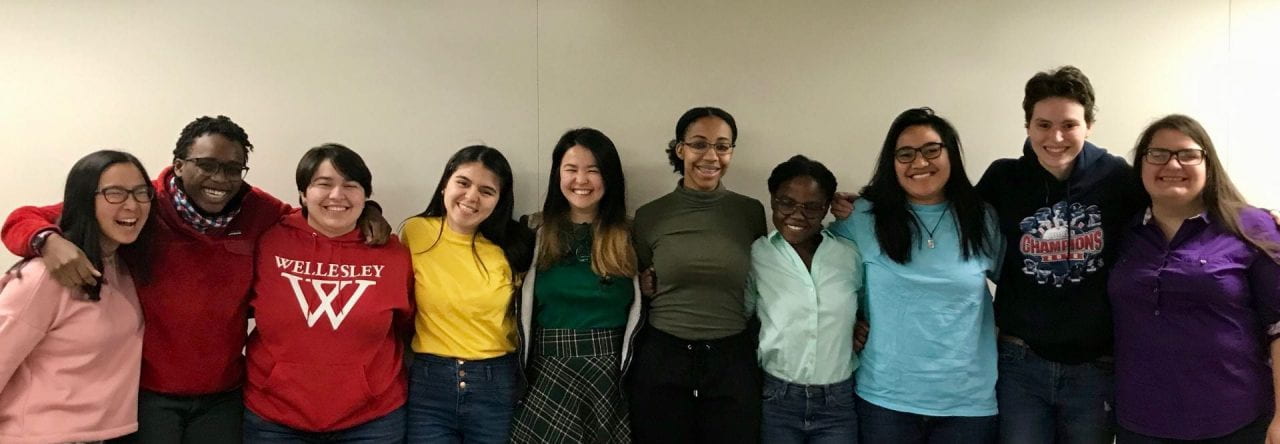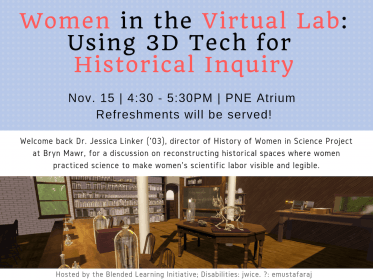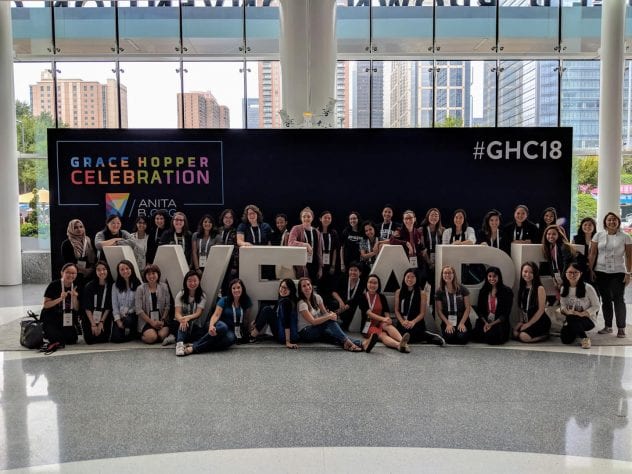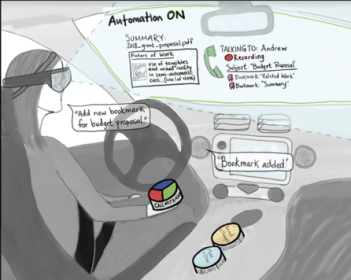On Thursday 15 November, Wellesley’s Blended Learning Initiative hosted Jessica Linker ’03, director of the History of Women in Science Project at Bryn Mawr, returned to campus to speak about Women in the Virtual Lab: Using 3D Tech for Historical Inquiry.
Category: News (Page 2 of 9)
Takis Metaxas, Professor of CS and faculty director of the Madeleine Korbel Albright Institute for Global Affairs, is featured on the College’s daily shot describing his work with the nonprofit research institute Project Information Literacy for his work on How Students Engage with News: Five Takeaways for Educators, Journalists, and Librarians.
With the start of the Fall 2018 semester, the Wellesley Computer Science Department is (belatedly) delighted to welcome and re-welcome 5 new and continuing faculty.
Our continuing colleague  Christine Bassem, Assistant Professor of Computer Science, initially joined Wellesley as a Lecturer in Computer Science after completing her PhD at Boston University in 2015. Her current research interest is on the design and analysis of incentive-compatible mechanisms for socially-aware networking, specifically in the domains of crowd sensing and opportunistic networks. She enjoys reading, doodling, and spending time with her family.
Christine Bassem, Assistant Professor of Computer Science, initially joined Wellesley as a Lecturer in Computer Science after completing her PhD at Boston University in 2015. Her current research interest is on the design and analysis of incentive-compatible mechanisms for socially-aware networking, specifically in the domains of crowd sensing and opportunistic networks. She enjoys reading, doodling, and spending time with her family.
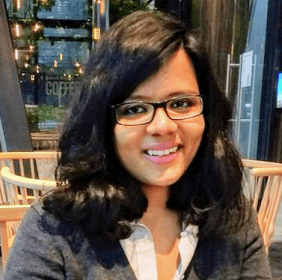 Shikha Singh, Assistant Professor of Computer Science, is a theoretical computer scientist who does research in the area of algorithmic game theory and algorithms for big data. As part of her dissertation research, she worked extensively on designing mechanisms for incentivizing correct behavior from service providers in internet marketplaces. Shikha is also interested in the area of online algorithms, secure data structures, combinatorial optimization and complexity theory. Her research work has been recognized by multiple fellowships such as the John Marburger III Fellowship for Science, Engineering, and Mathematics, Chateaubriand Fellowship and Renaissance Technology Fellowship. Shikha joins us from Stony Brook University where she completed her PhD. She is teaching CS235 this fall. Come say hi to Shikha in SCI E114.
Shikha Singh, Assistant Professor of Computer Science, is a theoretical computer scientist who does research in the area of algorithmic game theory and algorithms for big data. As part of her dissertation research, she worked extensively on designing mechanisms for incentivizing correct behavior from service providers in internet marketplaces. Shikha is also interested in the area of online algorithms, secure data structures, combinatorial optimization and complexity theory. Her research work has been recognized by multiple fellowships such as the John Marburger III Fellowship for Science, Engineering, and Mathematics, Chateaubriand Fellowship and Renaissance Technology Fellowship. Shikha joins us from Stony Brook University where she completed her PhD. She is teaching CS235 this fall. Come say hi to Shikha in SCI E114.
 Andrew Davis, Lecture in Computer Science, examines the relationships between computer science and music. Trained as a composer, Andrew’s research looks at how computer coding can be used to digitally create music. His background is in music where he earned a PhD in music composition from the University of Pennsylvania. Most recently he completed his graduate work in computer science from Stanford University. This semester, Andrew is excited to be teaching CS111!
Andrew Davis, Lecture in Computer Science, examines the relationships between computer science and music. Trained as a composer, Andrew’s research looks at how computer coding can be used to digitally create music. His background is in music where he earned a PhD in music composition from the University of Pennsylvania. Most recently he completed his graduate work in computer science from Stanford University. This semester, Andrew is excited to be teaching CS111!
 Peter Mawhorter, Instructor in the Computer Science Laboratory, does research on generative AI, with a special focus on computational narrative and implicit generative algorithms. His work overlaps with psychology, cognitive science, and literature, and part of his dissertation developed a theory of choice poetics. He comes to Wellesley from MIT, where he did a postdoc studying virtual identity systems, and before that from Pomona College, where he was a visiting professor for a year, and from UC Santa Cruz, where he got his PhD. Peter is teaching labs for CS 111 and CS 115 in both the Fall and Spring semesters this year, and you can stop by his office to say hi at SCI E128.
Peter Mawhorter, Instructor in the Computer Science Laboratory, does research on generative AI, with a special focus on computational narrative and implicit generative algorithms. His work overlaps with psychology, cognitive science, and literature, and part of his dissertation developed a theory of choice poetics. He comes to Wellesley from MIT, where he did a postdoc studying virtual identity systems, and before that from Pomona College, where he was a visiting professor for a year, and from UC Santa Cruz, where he got his PhD. Peter is teaching labs for CS 111 and CS 115 in both the Fall and Spring semesters this year, and you can stop by his office to say hi at SCI E128.
 Sam McCauley joins us during the Fall 2018 semester as a Postdoctoral Fellow. He completed his PhD at Stony Brook University, and attended Tufts University as an undergraduate. Sam is interested in algorithms and data structures, particularly in problems that come up when querying large databases. He focuses largely on external-memory algorithms, data structures for similarity search, and scheduling algorithms. Part of what he finds exciting about these areas is that structural insights from theory can lead to significant speedup in practice. Sam is teaching CS 115 this fall.
Sam McCauley joins us during the Fall 2018 semester as a Postdoctoral Fellow. He completed his PhD at Stony Brook University, and attended Tufts University as an undergraduate. Sam is interested in algorithms and data structures, particularly in problems that come up when querying large databases. He focuses largely on external-memory algorithms, data structures for similarity search, and scheduling algorithms. Part of what he finds exciting about these areas is that structural insights from theory can lead to significant speedup in practice. Sam is teaching CS 115 this fall.
Over the summer in 2018, A shley DeFlumere, former Lecturer in Computer Science at Wellesley, moved on to Ireland, where she has joined Intel Labs as a research scientist. Ashley is missed around the department at Wellesley, where she taught CS 230 Data Structures, CS 240 Foundations of Computer Systems, and a course on her research area: Scientific and Parallel Computing, not to mention helping to anchor the department’s extracurricular activities. Behind the scenes, she also led the foundation and development of peer mentoring and tutor training programs which have become valuable additions in CS courses. Best wishes!
shley DeFlumere, former Lecturer in Computer Science at Wellesley, moved on to Ireland, where she has joined Intel Labs as a research scientist. Ashley is missed around the department at Wellesley, where she taught CS 230 Data Structures, CS 240 Foundations of Computer Systems, and a course on her research area: Scientific and Parallel Computing, not to mention helping to anchor the department’s extracurricular activities. Behind the scenes, she also led the foundation and development of peer mentoring and tutor training programs which have become valuable additions in CS courses. Best wishes!
Emma Lurie ’19 presented Investigating the Effects of Google’s Search Engine Result Page in Evaluating the Credibility of Online News Sources, a paper coauthored with Eni Mustafaraj, in May at the ACM WebSci 2018 conference in Amsterdam.
As a result of the discussion of this paper, a challenge to improve Wikipedia was created. Students in the Wellesley Cred Lab, led by Mustafaraj, are preparing Wikipedia edit-a-thons to involve Wellesley students in the challenge, and will be responsible for measuring the page creation and author participation impacts of the full challenge.
Orit Shaer, Class of 1966 Associate Professor of Computer Science, received two grants from NSF in support of collaborative research in the Wellesley HCI Lab:
UbiqOmics: HCI for augmenting our world with pervasive personal and environmental omic data, is a continuation of our previous grant on HCI for personal genomics. This is a collaborative grant with Oded Nov (NYU) and Mad Ball (Open Humans). The project will focus on human-computer interaction for UbiqOmic environments: living spaces and social interactions where omic data is available about people, plants, animals, and surfaces. Recent years have seen a sharp increase in the availability of personal and environmental ‘omic’ data (e.g. data about genomes or microbiomes) to non-experts. In particular, the team will identify user needs and develop web-based visual tools that integrate omic data sets from heterogeneous resources and multiple samples. These tools will allow users to aggregate, explore, relate, and connect pervasive omic information, and facilitate collaborative sense making of omic information within various social contexts including families and cohabiting communities. In addition, the project will harness the power of augmented reality (AR) to visualize the invisible, designing, developing, and evaluating an AR interface which overlays timely and actionable omic data in the environment and on the user’s own body (oral, gut, skin). Jennifer Otiono ’18 joined the HCI Lab as a post-bac research fellow on this project.
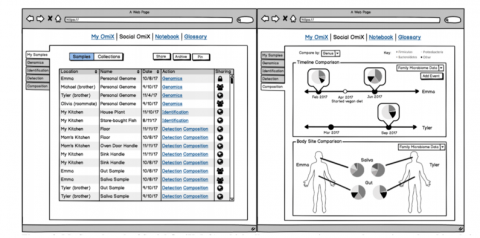
A design for a Social OmiX app, which allows users to view, sort, share, pin, and archive their omic- samples and the samples of others that have been shared with them.
The second grant is a new large collaborative project funded by the NSF program on the Future of Work, titled The Next Mobile Office: Safe and Productive Work in Automated Vehicles. This is a collaboration with Andrew Kun (University of New Hampshire), Raffaela Sadun (Harvard Business School), Linda Boyle (University of Washington), John Lee (University of Wisconsin). The project focuses on understanding how technology can allow commuters in highly automated (but not yet fully autonomous) cars to safely combine or switch between work and driving tasks. We will develop a new multi-interface in-vehicle environment for the support of work-related tasks, as well as safe driving, in automated vehicles and will test in driving simulators and real vehicles. We believe that the innovative contributions to the in-vehicle use of speech and spoken interactions, augmented reality, and tangible user interfaces will have applicability to a broad range of settings, including for non-drivers and in mobile environments beyond the car. The project also includes activities to promote the participation of women in Science, Technology, Engineering and Mathematics. Diana Tosca ’18 joined this project as a post-bac research fellow.
